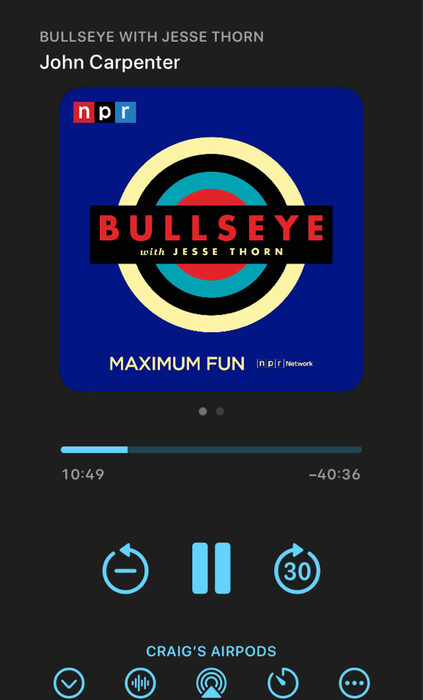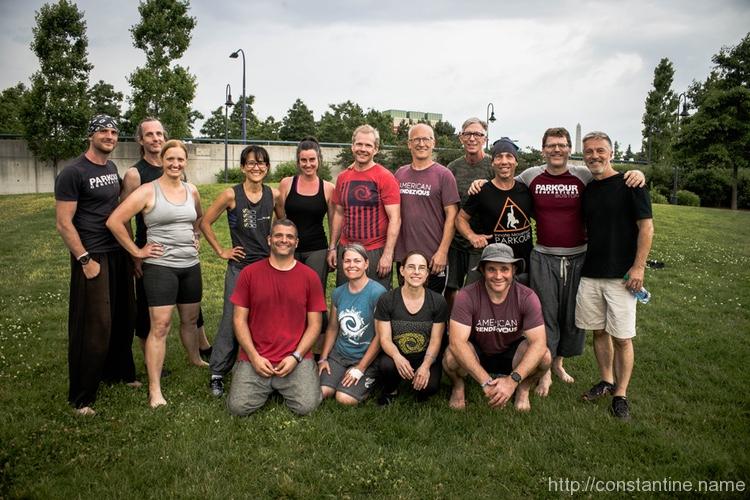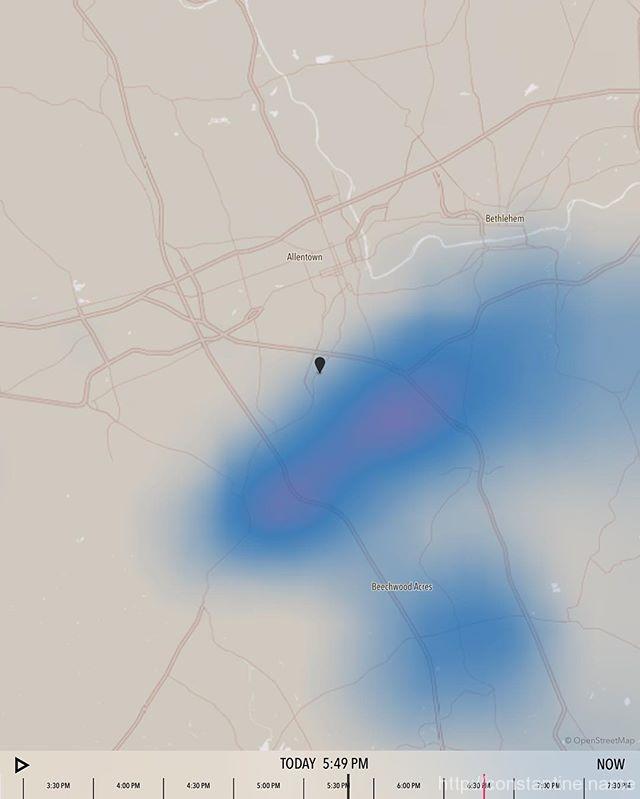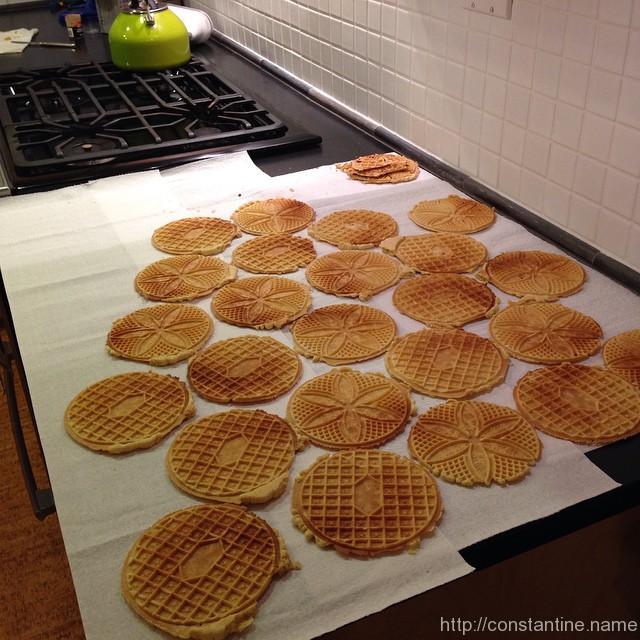Tune in to this Bullseye episode…


Tune in to this Bullseye episode…
I recall a little sign which was sometimes spotted on desks, back in the before-times when everyone had a desk and papers and ring-binders and books and a telephone that also sat upon that desk. The sign was: “A messy desk is a sign of genius.” (And sometimes it said, “…of a creative mind.” )
I’ve had a lot of desks. In every case, I’ve always swerved repeatedly between messy and organized. I get to a point where—sometimes with a literal scream—I stop working and reorganize everything. For a long time, I hoped that one day I would manage to be just comfortable enough, with just the right amount of clutter and chaos, to be able to reach a steady state.
One detail that drives me bonkers is in the digital realm, computers are perfectly organized. I use a tool (called Reeder) to manage a read-this-later collection. It’s a big collection often reaching 500 different things marked as possibly interesting. (Some are interesting enough to spend a few minutes on, some are interesting enough to spend hours on.) Sometimes I’ll randomly shuffle things in a digital list. But sometimes… the list is just ordered the way you assemble it. And you can look at the list in forward or reverse order. This gets to me. If it’s a big list, neither forwards or backwards is best. So instead, I do both: I read the item off one end (the thing that’s been in the list longest) and then the other (the newest), and I just alternate in a reading session.
Perhaps this seems like a silly or trivial thing to point out. But there’s a bigger lesson: Where do I have some specific structure (organization, ordering, etc.) that I didn’t actually intend? …is that structure holding me back or keeping me from experiencing something I’d prefer?
ɕ
Reading is letting someone else model the world for you. This is an act of intimacy. When the author is morose, you become morose. When he is mirthful, eventually you may share it. And after finishing a very good book one is driven a little mad, forced to return from a world that no one nearby has witnessed.
~ Simon Sarris
slip:4a1295.
Reading time: About 4 minutes, 900 words
Get 7 for Sunday in your inbox. → Subscribe here.
This issue is https://7forsunday.com/1
The more fun your work, the less likely it is to set off these triggers. You won’t struggle to focus—tasks will attract your attention because they’ll be far less tedious, frustrating, challenging, and so on. There are a lot of strategies for overcoming procrastination. But making a project more fun disables a bunch of procrastination triggers at once, while also making your work more enjoyable. It’s a great strategy.
~ Chris Bailey from, How to stop procrastinating by making your work more fun – Chris Bailey
slip:4uciho3.
Great little article from Bailey with great points about the really common things that trigger procrastination, and some ideas on how to beat each one. What’s been working for me for a while is something inspired by Yoda’s comment that, “named your fear must be, before banish it you can.” I can tell when I’m procrastinating; perhaps not always, but definitely often. At the point of realization, I play the name–game: “Craig, what exactly is it that you don’t want to do?” Then like the school guidance counselor always trying to talk me out of sabotaging myself into detention, “Are you sure that’s the thing? Be specific.” Upon realizing I’m still in their office, “I don’t think you’re as sure as you think you are. Can you explain it to me like I’m 5 years old?” Until eventually, it’s so blinding clear what I need to do (or skip, or change, or screw up 3 minutes of courage, or whatever) that I just freaking stomp that procrastination.
ɕ
Training prepares your body and, most important, your mind for ascent through consistent, hard, disciplined practice.
~ Mark Twight
Go simply, train smart, climb well.
slip:4a607.
I’m not certain, but this probably will only make sense if you are a certain age, and grew up in a house with a garage. It doesn’t need to have been “dad’s garage,” nor a space dedicated to fixing things, nor even sheltered an automobile. No, it only matters that you grew up in a house with a garage.
There’s magic in having an indoor space with a concrete floor. A floor that clearly has taken a beating, and is ready for more abuse. A space with a slightly different sort of door dividing it from the soft and people-oriented rest of the house. A space where things were maybe a little less organized, but definitely were more out in plain sight. Maybe there was some sort of workbench? Maybe some tools. Maybe a lot of tools? Regardless, pretty much all the “where should we put this?” stuff wound up in the garage. Painting something? Garage. Taking something part? Not on the carpet! …in the garage. Fixing your bike? New wheels on your skate board? You get the idea. You either know what I’m talking about, or you don’t.
Did you do, whatever you did, with the garage door open, or closed? Weather permitting, throwing open that garage door was an invitation to the world—but hopefully, only the nice neighbors—to saunter up and at least watch. Turns out, that’s literally “showing your work.” A huge part of what I’m doing these days is working where I can be seen. There’s collateral recognition of course, but mostly it’s just scratching an itch to toss things on a workbench and throw open the ‘ol garage door.
If you know what I’m talking about, you can even hear that door opening.
ɕ
Imagine that you were to sign up for a retreat this month … you put aside your daily life, all your busywork, all your projects and errands and emails and messages … and you travel to another place. In this place, you remove yourself from the busy world and find space for quiet. For reflection. For contemplation, setting intentions, reviewing how things have gone. For gratitude and appreciation for life.
~ Leo Babauta from, The Practice of Using December for Retreat, Reflection & Letting Go – Zen Habits Website
slip:4uzede2.
Today, a rare two-fer’…
Not only does hyper-connection alter our social relationships, it also makes us dumber, as pointed out as early as 2005. It threatens our health too. Twenty-first-century afflictions include digital fatigue, social media burnout or compulsive internet use. Cures for these rising internet-related disorders include such radical solutions as rehab centers, or disconnection.
~ Antoine Lefeuvre from, Designing for Post-Connected Users — Part 1, the Diagnostic – A List Apart
slip:4uaico2.
Babauta’s take is from the Zen perspective of simply—as in: this is the only thing you have to do, and don’t overcomplicate it in the doing—creating space in your life. Lefeuvre’s is from a nuts-and-bolts perspective of facts and tactics.
I feel called quite often to take more time to reflect. I was going to write, “sit and reflect,” but it’s not quite always sitting. I believe this is also true for everyone else; some people are early on in their journeys and their need for reflection is small in total, but it is more than they are currently doing. With precious few exceptions, we could all use more time for reflection.
Do you have time for reflection built into your life?
ɕ
I think I may finally have reached a point where travelling is all-out pleasant. Not the sacharine, “I’m excited to be going on a vacation,” pleasant, but the really core-deep, “if this isn’t nice, I don’t know what is,” sort of pleasant.
For a long time I’ve been dutifully posting every day. It’s important to me because it involves writing and I’m a firm believer of: If you cannot write clearly, then you don’t think as clearly as you think you do. But as I departed for Seattle, I was simply okay with knowing I wasn’t going to write for a week (or more, as it turns out.)
Mind you, I get stopped by TSA every time. Even now that I’ve registered with the TSA as a known traveler, I still get “pulled aside.” On the way out, they looked for the podcast audio cables. On the way back, they wanted to see my bar of soap. Mind you, they’ve run a background check on me, and fingerprinted me to register as a “known traveler.” But at least I get to go to the speedy line for being pulled aside. And it was still pleasant. So many great things lay ahead and behind during both legs of the trip, that I was just like, “if this isn’t nice, I don’t know what is.” And, “yes sir, you’ll find the soap in that little black zipper back, in the black plastic case. It’s shaped liked a bar of soap. #sorrynotsorry about the hair.”
Driving into and out of the Cascade Mountains? Bonkers awesome. (Words fail me in case you cannot tell.)
Spending days with 100 friends old and new? Bonkers awesome.
Rustic cabin, roaring wood stove, food, conversations, 30 interviews with all the event presenters and session leaders, and the massive waves of positive comments and thank-you-s for the entire Movers Mindset project and team? Bonkers awesome.
Seattle AirBNB, coffee, 7 incredible interviews for the podcast, coffee, dinnerS with local friends, coffee, playing in Volunteer Park barefoot in “the tree,” coffee, random organic apples, coffee, more friends, more coffee? Bonkers. Awesome.
Home, then exhausted, then bronchitis and maybe some GI complications from my new friend Lyme Disease? Seriously, still bonkers awesome.
Chilly fall evening, grill going, sunset? Definitely bonkers awesome.
If this isn’t nice, I don’t know what is.
ɕ
How do movement, coaching, and family intersect to shape personal growth and relationships over time?
Chris Rowat and Shirley Darlington-Rowat discuss serendipity, coaching, and Chris’s work with the fire brigade. They share their thoughts on raising kids, setting aside time for family, and training and moving together. Shirley and Chris share their current struggles, some stories about their past, and how parkour has affected their relationship.
You should both be able to enjoy your lives. So if we enjoy training and it’s a part of our lives, we shouldn’t suppress that. We should just find ways to bring it all together.
~ Chris Rowat (31:27)
The conversation covers the intersection of parkour, family, and coaching, exploring how movement shapes personal relationships and growth. Chris and Shirley discuss serendipity, recalling stories of chance encounters and how unexpected moments influence their lives. They reflect on how their shared passion for parkour has not only shaped their relationship but also influenced how they raise their children, focusing on movement as play rather than formal practice.
[My son Tyler] didn’t see it as parkour, it was just movement. So he’d be in the play park and he’d maybe cycle on his bike to the climbing wall, climb up the little climbing wall, jump across a little piece of railing. He just moved. Movement is movement, right? So whatever [our daughter Indy] wants to do, she can do, if she doesn’t want to do parkour. She’ll do it naturally anyway because it’s normal for that too.
~ Shirley Darlington-Rowat (12:27)
Chris speaks about balancing his career with the London Fire Brigade and his role as a father, highlighting the discipline and adaptability required in both spheres. Shirley emphasizes the importance of maintaining personal movement practices during motherhood and reflects on how physical training can coexist with family life. The conversation weaves between stories of parenting, training, and the philosophy of finding balance and joy in movement.
Takeaways
Serendipity — Reflecting on how unexpected moments and connections shape experiences in life and movement.
Balancing movement and family — Finding ways to integrate training with raising children without forcing them into the same practices.
Coaching philosophy — Emphasizing personal connections and individual growth within group coaching environments.
Parkour as a relationship foundation — Sharing movement practice fosters honesty, mutual understanding, and emotional openness.
Postpartum training — The importance of patience, recovery, and adapting movement to suit physical changes.
Time management — Juggling careers, training, and parenting by focusing on effective, intentional practice within available time.
Resources
Parkour & Art du déplacement: Lessons in practical wisdom – Leçons de sagesse pratique — Vincent Thibault’s book referenced by Craig early in the conversation.
Parkour Generations — The organization where Chris and Shirley have been involved as coaches and athletes.
Rendezvous — The event where Chris and Shirley first met in 2008.
Yamakasi — A reference to the original parkour group, mentioned during Chris’s story about encountering Williams Belle.
London Fire Brigade — Chris’s current workplace, referenced throughout the conversation regarding his career transition.
(Written with help from Chat-GPT.)
ɕ


Haven’t been out in the rain in a while. Drizzling, dreary and humid. 30 days to go on this challenge (and I’m experimenting with a dietary change for these last 30 days. Big post at the end. :)
ɕ

Thanks @shanley.joe for a wee quirky challenge. Super-chill class on a muggy— wait, wat month is it? Why is it still summer?
ɕ
He who knows only his own generation remains always a child.
~ Cicero
slip:4a5.
I always wondered why somebody didn’t do something about that, then I realized I am somebody.
~ unknown
slip:4a45.

fresh pizzelle! visiting friends in Va this weekend #italianCookies
ɕ
For to practise parkour is to seek fear on a daily basis, to confront it head-on, to face it naked and alone. In parkour, you are stripped to your essence. There is no equipment to rely on, no safety harnesses or padding to protect you, no teammate to take the brunt when you are tired. It’s you, and you alone. The only things that prevent you getting hurt or injured are your skills, your judgement, your ability – no one else’s.
~ Dan Edwardes from, Moving Through Fear – Dan Edwardes
slip:4udamo2.
ɕ